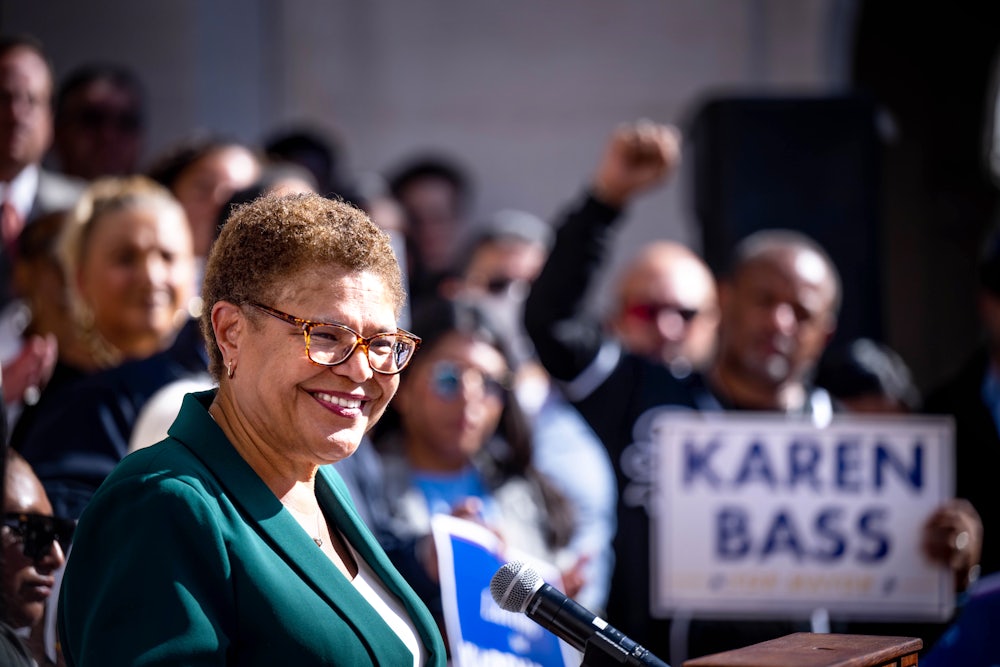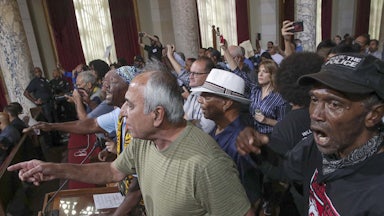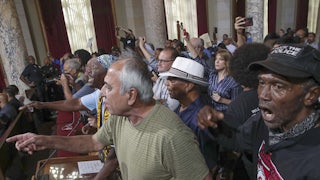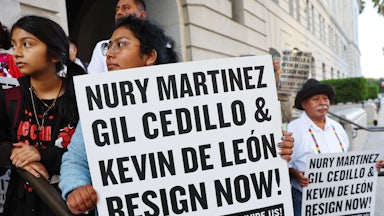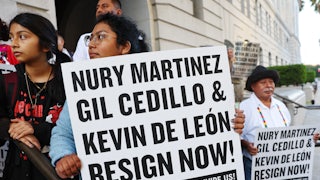It’s been a midterm election season that’s defied expectations and left the charred remains of conventional wisdom piled up for public consumption. But beneath the national scene, there are still tales to tell about trends being bucked. One of the more significant, under-the-radar stories has emerged in Los Angeles, where after months of vicious campaigns, headline-grabbing scandals, and a toxic politics that seemed to target the city’s most vulnerable residents, voters have carved out a space for a more hopeful and humane politics to take root and bloom.
Without a doubt, the biggest result was Representative Karen Bass’s defeat of billionaire developer and only recently former Republican Rick Caruso for the office of mayor. But it’s the down-ballot results that foretell a more sweeping change to come. Viewed as a whole, it’s clear that the November election was ultimately a referendum on inequality in Los Angeles and a rare moment when a notoriously stratified metropolis at last took a stab at closing the yawning gap between the haves and have nots.
Los Angeles has been at an inflection point since the Covid-19 pandemic began in 2020. The virus hit the city hard, exacerbating already extant crises of inequality and housing affordability and deepening concerns about shelter space for unhoused Angelenos and the sturdiness of the safety net upon which those in need depended. As the pandemic dragged on, officials seemed bent on undoing many of the programs that helped the underprivileged.
This manifested in a range of ways, from the violent police sweeps of unhoused encampments, against the advice of service providers and medical experts, to the tragic winding down of a hotel housing program that helped stop the spread of the virus. The Los Angeles City Council passed a punitive law against camping, while rich donors pushed for measures to sweep unhoused people out of sight without resolving the root causes of the crisis. On top of that, Los Angeles, like the rest of the country, was dealing with high inflation. The election put the entire metropolis at a crossroads: Take action to help people long-term or double down on a system that was increasingly unequal.
For the most part, Los Angeles city and county voters chose the former path. Much as the speculated “red wave” failed nationwide, the reactionary turn that many Angelenos feared was instead halted. Voters in large numbers backed candidates and ballot measures that would expand housing protections and development as well as mass transit. In Pasadena, voters approved rent control, while in Los Angeles, people authorized the city to spend more on affordable housing development.
Meanwhile Measure ULA, the tax on real estate sales over $5 million to fund both affordable and permanent supportive housing plus renter assistance and legal counsel passed handily. Given the rising cost of housing in the city—roughly half of income goes toward the average rent—and the risk of a looming surge in homelessness as evictions spike in 2023, it’s clear Angelenos were pushing back against the city becoming a home solely for the rich.
Although progressives failed to fully sweep the City Council (in one case, Traci Park beat progressive Erin Darling in the fight to replace Westside Councilman Mike Bonin, who himself had faced backlash against transit expansion and homelessness policies), voters rejected several established politicians and a right-wing mayoral candidate. A fifth of the City Council will be progressive in December. Coupled with a new mayor who seems like she’ll be more engaged than the aloof and outgoing Eric Garcetti, there’s a chance for a major shift in time and investment in the city.
The fight over city resources has been increasingly contentious since the pandemic started. Backlash to police brutality and high funding after the killing of George Floyd in 2020 only escalated the conflict, helping to frame what many activists saw as an overinvestment in violent security forces at the expense of social services. It’s no fluke that Kenneth Mejia’s focus on this very budgetary inequality helped him get a more than 20-point victory for city controller, beating an established city councilman, Paul Koretz. Mejia’s billboards around Los Angeles were eye-catching and direct, taking aim at the bloated police budget.
Los Angeles is also still reeling from leaked audio showing councilmembers and the now former president of the Los Angeles County Federation of Labor making racist and bigoted remarks toward groups of Angelenos and other officials while in a secret meeting tied to the 2021 redistricting process. Since the recording came out in October, Nury Martinez, then the Council president, has resigned and Councilmembers Gil Cedillo and Kevin de León have been mostly absent from city business, as they face calls to step down. It’s not clear exactly the extent to which the audio had an electoral impact—when it came out, Cedillo had already lost his reelection primary to Eunisses Hernandez, while de León and Martinez were not up for reelection—but the widespread anger at the officials, all establishment figures who mocked underprivileged people, was palpable during the last weeks of the campaign.
It makes sense that it was a likely factor as voters considered their options. As Alissa Walker at Curbed pointed out, the meeting recorded in that leaked audio and the redistricting scheme that those councilmembers were describing was, at bottom, a brazen attack on renters’ political power. Councilmember candidate Hernandez and Hugo Soto-Martínez (who defeated a councilmember who backed a violent clearing of encampments at Echo Park Lake) positioned themselves as advocates for tenants’ rights and won conspicuous victories. In October, they and Assemblyman Isaac Bryan, part of the state’s first renters’ caucus, stood together in the council chamber against the officials on the tape and in support of protesters. Meanwhile, Lindsey Horvath, who won the Board of Supervisors seat being vacated by the retiring Sheila Keuhl, will be the only renter on the five-person board. Roughly two-thirds of Los Angeles residents are renters, and now they have a clear bloc of advocates in power.
The exact ideological bearing of the council remains to be seen. More changes are coming: A special election is set for Martinez, it’s unclear if de León will bow to pressure to resign, and Heather Hutt is on the council pending results of a trial for Mark Ridley-Thomas.
Los Angeles has a weak mayor by nature, but the race for the office was still important. Caruso spent $100 million of his own funds on his vision, blanketing the city in ads (including ones that distorted past popular ballot measures), selling a faux-Americana idea of the city that felt like it was stripped from one of the shopping mall mogul’s brochures. Although Bass is not a progressive, she campaigned on a more inclusive approach to Los Angeles and acknowledged the parts of the city outside wealthy areas. And while her platform on homelessness lacked an emphasis on permanent housing and still relied in part on policing, it promised more than punitive measures and long-term temporary shelters. Viewed through that lens, it’s hardly surprising that a good chunk of Downtown Los Angeles—the epicenter of the region’s homelessness crisis and a stark example of rental inequality, including all of Skid Row—favored Bass over Caruso. (Pockets of voters in the central business district and two blocks of the Toy District went hard for the developer, however.)
There are some wider impacts the new mayor can make. Bass will sit on the board of the Los Angeles Metropolitan Transportation Authority; she demonstrated more support for public transportation options than the skeptical-at-best Caruso. Moreover, Bass will have a hand in helping to implement elements of ULA.
Naturally, it remains to be seen how quickly these results spark noticeable change. Newly elected members take power in December, and the policies voters supported will go into effect later; ULA, for instance, won’t go into effect until the spring, and even then, its impact likely will not be felt for some time. And there is still much to be done to protect the most vulnerable Angelenos. The city’s last pandemic-related protections are set to expire. The eviction moratorium is currently set to end early next year; with past rental assistance poorly rolled out, many are at risk of falling into homelessness. Widespread affordable housing development is, for now, largely stalled due to the costs of construction and lack of funds. The city’s version of Project Roomkey, which placed unhoused people in hotel and motel rooms to isolate and avoid the virus, is down to only two facilities and heading for full closure.
There is much to be done, and a lot of uncertainty about whether Los Angeles can truly reverse course on the widespread inequality that’s come to define daily existence. But this year’s elections presented the most sweeping opportunity for voters to demand grassroots representation and issue a mandate for a more just economy. It looks like they took it.
